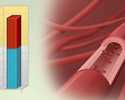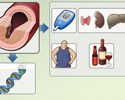Cholesterol and lifestyle
Hyperlipidemia - cholesterol and lifestyle; CAD - cholesterol and lifestyle; Coronary artery disease - cholesterol and lifestyle; Heart disease - cholesterol and lifestyle; Prevention - cholesterol and lifestyle; Cardiovascular disease - cholesterol and lifestyle; Peripheral artery disease - cholesterol and lifestyle; Stroke - cholesterol and lifestyle; Atherosclerosis - cholesterol and lifestyle
Your body needs cholesterol to work well. But cholesterol levels that are too high can harm you.
Cholesterol is measured in milligrams per deciliter (mg/dL). Extra cholesterol in your blood builds up inside the walls of your blood vessels. This buildup is called plaque, or atherosclerosis. Plaque reduces or stops blood flow. This can cause a:
-
Heart attack
Heart attack
Most heart attacks are caused by a blood clot that blocks one of the coronary arteries. The coronary arteries bring blood and oxygen to the heart. ...
 ImageRead Article Now Book Mark Article
ImageRead Article Now Book Mark Article -
Stroke
Stroke
A stroke occurs when blood flow to a part of the brain stops. A stroke is sometimes called a "brain attack. " If blood flow is cut off for longer th...
 ImageRead Article Now Book Mark Article
ImageRead Article Now Book Mark Article - Serious heart or blood vessel disease
Your Cholesterol Numbers
All men should have their blood cholesterol levels tested every 5 years, starting at age 35. All women should do the same, starting at age 45. Many people should have their blood cholesterol levels tested at a younger age, possibly as early as age 20, if they have risk factors for heart disease. Have your cholesterol checked more often (probably every year) if you have:
-
Diabetes
Diabetes
Diabetes is a chronic disease in which the body cannot regulate the amount of sugar in the blood.
 ImageRead Article Now Book Mark Article
ImageRead Article Now Book Mark Article -
Heart disease
Heart disease
Heart disease - prevention; CVD - risk factors; Cardiovascular disease - risk factors; Coronary artery disease - risk factors; CAD - risk factors...
Read Article Now Book Mark Article - Blood flow problems to your feet or legs
- A history of stroke
A blood cholesterol test measures the level of total cholesterol. This includes HDL (good) cholesterol and LDL (bad) cholesterol.
Your LDL level is what health care providers watch most closely. You want it to be low. If it gets too high, you will need to treat it.
Treatment includes:
- Eating a healthy diet
- Losing weight (if you are overweight)
- Exercising
You may also need medicine to lower your cholesterol .
Medicine to lower your cholesterol
Hyperlipidemia - drug treatment; Hardening of the arteries - statin

You want your HDL cholesterol to be high. Exercise can help raise it.
Eating Right
It is important to eat right, keep a healthy weight, and exercise, even if:
- You do not have heart disease or diabetes.
- Your cholesterol levels are in the normal range.
These healthy habits may help prevent future heart attacks and other health problems.
Eat foods that are low in fat. These include whole grains, fruits, and vegetables. Using low-fat toppings, sauces, and dressings will help.
Look at food labels. Avoid foods that are high in saturated fat. Eating too much of this type of fat can lead to heart disease.
- Choose lean protein foods, such as soy, fish, skinless chicken, very lean meat, and fat-free or 1% dairy products.
- Look for the words "hydrogenated", "partially hydrogenated", and "trans fats" on food labels. DO NOT eat foods with these words in the ingredients lists.
- Limit how much fried food you eat.
- Limit how many prepared baked goods (donuts, cookies, and crackers) you eat. They may contain a lot of fats that are not healthy.
- Eat fewer egg yolks, hard cheeses, whole milk, cream, ice cream, and cholesterol and lifestyle.
- Eat less fatty meat and smaller portions of meat, in general.
- Use healthy ways to cook fish, chicken, and lean meats, such as broiling, grilling, poaching, and baking.
Eat foods that are high in fiber. Good fibers to eat are oats, bran, split peas and lentils, beans (kidney, black, and navy beans), some cereals, and brown rice.
Learn how to shop for, and cook, foods that are healthy for your heart. Learn how to read food labels to choose healthy foods. Stay away from fast foods, where healthy choices can be hard to find.
Get plenty of exercise. And talk with your provider about what kinds of exercises are best for you.
References
American Diabetes Association. Standards of Medical Care in Diabetes-2016 Abridged for Primary Care Providers. Clin Diabetes . 2016;34(1):3-21. PMID: 26807004 www.ncbi.nlm.nih.gov/pubmed/26807004 .
Heimburger DC. Nutrition's interface with health and disease. In: Goldman L, Schafer AI, eds. Goldman's Cecil Medicine . 25th ed. Philadelphia, PA: Elsevier Saunders; 2016:chap 213.
Mozaffarian D. Nutrition and cardiovascular and metabolic diseases. In: Mann DL, Zipes DP, Libby P, Bonow RO, Braunwald E, eds. Braunwald's Heart Disease: A Textbook of Cardiovascular Medicine . 10th ed. Philadelphia, PA: Elsevier Saunders; 2015:chap 46.
Pencina MJ, Navar-Boggan AM, D'Agostino RB Sr, et al. Application of new cholesterol guidelines to a population-based sample. N Engl J Med . 2014;370(15):1422-1431. PMID: 24645848 www.ncbi.nlm.nih.gov/pubmed/24645848 .
Stone NJ, Robinson J, Lichtenstein AH, et al. 2013 ACC/AHA guideline on the treatment of blood cholesterol to reduce atherosclerotic cardiovascular risk in adults: a report of the American College of Cardiology/American Heart Association Task Force on Practice Guidelines. Circulation . 2014;129(25 Suppl 2):S1-45. PMID: 24222016 www.ncbi.nlm.nih.gov/pubmed/24222016 .
-
Hardening of arteries
Animation
-
Hyperlipidemia - overview
Animation
-
Hyperlipidemia: types, cholesterol and triglyceride
Animation
-
Saturated fats - illustration
Saturated fats are found predominantly in animal products such as meat and dairy products, and are strongly associated with higher cholesterol levels. Tropical oils such as palm, coconut, and coconut butter, are also high in saturated fats.
Saturated fats
illustration
-
Hardening of arteries
Animation
-
Hyperlipidemia - overview
Animation
-
Hyperlipidemia: types, cholesterol and triglyceride
Animation
Review Date: 8/22/2016
Reviewed By: Laura J. Martin, MD, MPH, ABIM Board Certified in Internal Medicine and Hospice and Palliative Medicine, Atlanta, GA. Also reviewed by David Zieve, MD, MHA, Isla Ogilvie, PhD, and the A.D.A.M. Editorial team.




